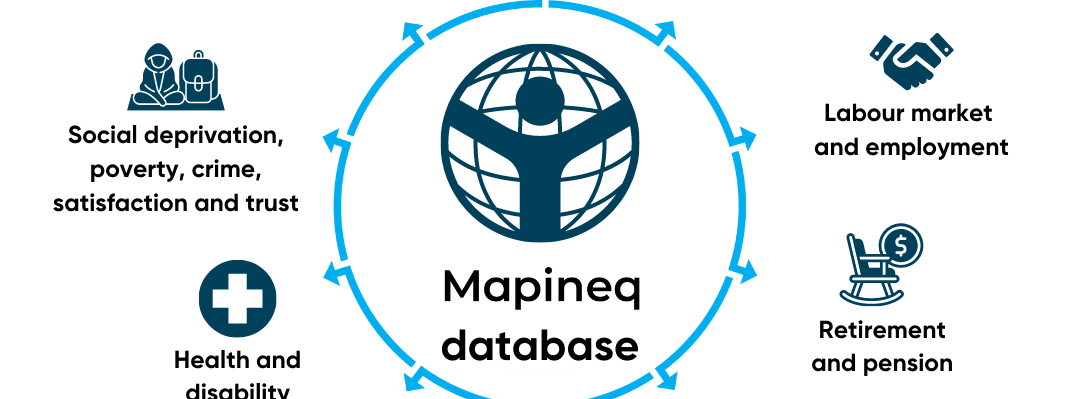The University of Groningen is looking for a Postdoc to work with the Leverhulme Centre for Demographic Science on an EU funded MapIneq project. Find out more and apply here.
The full job description and more information on how to apply can be found here
The postdoc will work on the project, “Mapping Inequalities through the Life Course (MapIneq)” which is an EU funded multidisciplinary consortium of leading international scholars working to understand the trends and drivers of intergenerational, educational, labour market, and health inequalities over the life course during the last decades. These inequalities are strongly correlated and highly dependent on both institutional and local contexts such that changes in one type of inequality often lead to unintended changes in another sphere of life. This kind of interplay between life domains makes it challenging to design and implement policies targeting inequalities effectively: the expected impact at the national or supranational levels may turn out to vary considerably within nations, or even reverse entirely in specific local contexts. The main driving research questions of the MapIneq project are: (1) How do local and national opportunity structures enhance, suppress or mediate inequalities? (2) How do changes and spillovers across the life domains and over life course contribute to inequalities? (3) How are inequalities influenced by policies and societal shocks?
The postdoc will lead and collaborate on development of Bayesian statistical models and/or machine learning approaches to identify and map relationships between geo-linked policies, locations, environmental factors, and social outcomes. Techniques can be used to examine which policy is more effective or relevant for particular outcomes (e.g., education, labour market, health). The postdoc will work closely with lead researchers at the Leverhulme Centre for Demographic Science, University of Oxford to contribute to and apply an open-access spatial database of policies related to education, family, labour market, social benefits, environmental context and taxes. The database will spatially-link these policies with subnational information on social and institutional structures as well as physical environments relevant for the effectiveness of such policies. This database provides a foundation for studying inequalities across various life stages and spatial scales including the interactions among them. The postdoc will also collaborate on the development of an interactive web dashboard for mapping these data and communicating key findings to local and national-level policy-makers and the public. The postdoc will also use the database to study the empirical relationship between individuals’ local spatial constraints and opportunities (e.g., local rent and housing prices, digital access, infrastructure) on economic resources and ability to meet basic needs. The relationship between local and regional differences in environmental inequalities (e.g., green space, pollution, traffic, distance to key services) will also be linked to individual labour market and health inequality outcomes.
The postdoc will be expected to publish high impact peer-reviewed articles in leading academic journals, but also to communicate directly with policy-makers throughout the project to develop innovative new strategies for reducing inequalities within local contexts.
Qualifications
We are looking for an enthusiastic postdoc with a keen interest in interdisciplinary collaboration to discover fundamentally new ways to address social inequalities and effectively communicate relevant findings to policy-makers and the public.
The successful candidate will have:
-
a PhD in economics, econometrics, demography, sociology, statistics, geography, or a related field
-
Bayesian statistics expertise (i.e. BUGS, JAGS, or Stan)
-
programming experience in R and preferably also Python, as well as a commitment to openly publishing code through GitHub or similar
-
substantive interest in topics related to inequality, education, the labour market and/or health outcome
-
database management experience, particularly with spatial databases such as PostGIS/PostgreSQL would be desirable
-
experience developing web applications (e.g. JavaScript, Python, SQL) would be desirable.
Conditions of employment
The Postdoc offers, following the Collective Labour Agreement for Dutch Universities:
-
a salary of € 3,557 gross per month, up to a maximum of € 4,670 gross per month (salary scale 10) dependent on relevant experience and training
-
a holiday allowance of 8% gross annual income and an 8.3% year-end bonus
-
a full-time position (1.0 FTE) for three years. The successful candidate will first be offered a temporary position of one year with the option of renewal for another two years. Prolongation of the contract is contingent on satisfactory performance during the first year.
Starting date: as soon as possible
Application
You may apply for this position until 9 March 11:59pm / before 10 March 2023 Dutch local time (CET) by means of the application form here (click on "Apply" below on the advertisement on the university website).
The application package must include the following documents:
-
a motivation letter (max two pages; A4 single side)
-
Curriculum vitae
-
contact information for two academic references. Please do not submit letters of reference. If necessary, we will contact the referees ourselves.
Information
For information you can contact:
-
Prof. Gerard van den Berg, gerard.van.den.berg@rug.nl
Please do not use the e-mail address(es) above for applications.
The full job description and more information on how to apply can be found here




